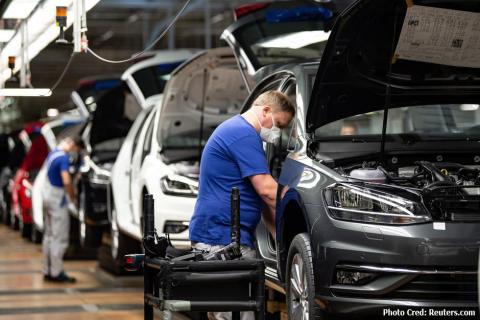Longterm Effects of Covid-19 on Auto Industry

Science says it takes 66 days to form a new habit. Most people started self-quarantine in the beginning of March, so things will probably never go back to how they were before Covid-19. We’ve all changed a little - businesses and individuals.
This goes for regular operations and sales at car dealerships as well. So how will things change long term?
Fixed Ops
The need to have a car serviced hasn’t changed, but the way it is done sure has, as in the capability of online service appointments in dealerships. Wiping down all of the interior surfaces of a vehicle was never part of an oil change until recently. Consumers can expect a sanitized vehicle before and after the service is performed, which is something people will now be used to and expect from here on out.
They might also prefer to continue contact-free drop off and pick up, using their phone to communicate with a service writer. The real kicker will be the possible expectation that a service tech will come and pick up a customer’s car from their home or workplace and deliver it back to them after the appointment is finished. Instead of dreading that upcoming service appointment, consumers may end up finding the experience convenient and rewarding, but at what cost? Time is money, and continuing this practice could get expensive for dealers.
Cleaning Standards
Spatial awareness and sanitization protocols are at the front of everyone’s mind when they go in public, including at car dealerships. Keeping your store clean by government standards is the new normal when it comes to retail, and it will not easily be forgotten about even with restrictions being lifted and stores opening up. Common items previously offered to a customer while at a dealership are popcorn or a bottle of water. Now, there will be masks, hand sanitizer, disinfectant wipes, and designated pens to protect both dealer and consumer.
Furniture will be arranged in a way to ensure social distancing and every surface will have to be cleaned after each interaction. Salespeople will have to take precautions with items such as keyboards, mice, paperwork, pens, their desk surfaces, and anything else the customer might touch and vice versa. Being that symptoms don’t show up for weeks, these precautions are here to stay for the long term. Even after government mandated cleaning is lifted, people will still be concerned about careful cleaning. Everyone will be more aware of what they touch and how anything could be contaminated. With the amount of traffic that runs through a dealership, there will need to be a good amount of supplies at all times to sanitize everything, which means budgeting for more than ever before for your cleaning supplies.
Wholesale Auctions
Physical auctions have been put completely on hold since the stay-at-home orders were set. Auction companies then attempted to increased digital auctions as a way to bring in sales, although initially they were not very successful. As restrictions continued, digital auctions became the only option while Covid-19 is still a threat and will continue in the future. Most tech savvy dealers were already doing their auction buying online because it gave them more options, and it’s more convenient.
Post-Covid, we expect to see dealers continuing to utilize online auctions at a higher rate than before. Of course, live auctions will return, and dealers will go to them, but less than before. Auction companies and dealers are using this time to perfect their online processes for buying and selling wholesale vehicles. They won’t just throw all that away when things go back to “normal.”
Manufacturing
While some production plants have opened up, the amount being produced isn’t nearly close to what it was before as assembly lines are slowly getting back up to speed. Returning to normal is a long road ahead and some predict we won’t get there until spring of next year.
Car Sales
The sales recovery is slow but not because of the lack of customers. Dealers are pressed to refine their online buying capabilities while refining the selling process which should be 100% virtual to please the car buying public today. Online car buying is not news for most dealers, but this pandemic is pushing them to get more aggressive about making it simple and profitable. This is not a trend. It is the future! Notably it saves big bucks and reduces personnel costs. Many dealers report now working shorter hours with fewer salespeople, for instance.
Inventory shortages are a severe problem, suppressing new vehicle sales, making the recovery slower than it actually is. Used vehicle inventories are suppressed by the lack of trade-ins and rental companies holding back from release vehicles until wholesale prices improve.
Take the lead from popular franchises like CarMax and Carvana. They have adopted their own way of selling cars that helps them survive, even during a crisis. A lot of these plans were already in the works but were expedited. CarMax has curbside assistance when picking up a car from service or when test driving after completing most of the purchasing logistics online. Carvana already had a futuristic vibe going on, but now with their touchless delivery, all items such as paperwork and keys are left inside the sanitized vehicle and are hauled by a representative. Any last minute communication is done over the phone with the representative on standby.
Once a consumer experiences this kind of convenience and protection, they will want the same for future engagements. They will want it everywhere they go, so many businesses will be adjusting to meet these changing needs. The option to buy a car completely online will need to be established, and having a touchless pickup or delivery option will be requested more often.
There is a generous amount of talk concerning when things will be back to normal, but let’s face it, what is normal? Every set back requires time and flexibility to make it work and causes basic changes in processes, which become the new normal. What used to be will never ever be again. We have technology and fresh ideas on our side to reinvent the game, during and after the pandemic subsides. Showrooms might not be as full and in-person car purchases may decrease, but car dealerships can still provide their best to consumers in this time of crisis and in the future.






